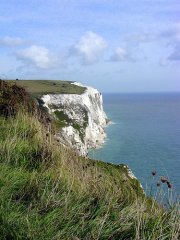Dover Beach
Matthew Arnold
The sea is calm to-night.
The tide is full, the moon lies fair
Upon the straits;—on the French coast the light
Gleams and is gone; the cliffs of England stand,
Glimmering and vast, out in the tranquil bay.
Come to the window, sweet is the night-air!
Only, from the long line of spray
Where the sea meets the moon-blanch'd land,
Listen! you hear the grating roar
Of pebbles which the waves draw back, and fling,
At their return, up the high strand,
Begin, and cease, and then again begin,
With tremulous cadence slow, and bring
The eternal note of sadness in.
The Sea of Faith
Was once, too, at the full, and round earth's shore
Lay like the folds of a bright girdle furl'd.
But now I only hear
Its melancholy, long, withdrawing roar,
Retreating, to the breath
Of the night-wind, down the vast edges drear[14]
And naked shingles of the world.
Ah, love, let us be true
To one another! for the world, which seems
To lie before us like a land of dreams,
So various, so beautiful, so new,
Hath really neither joy, nor love, nor light,
Nor certitude, nor peace, nor help for pain;
And we are here as on a darkling plain
Swept with confused alarms of struggle and flight,
Where ignorant armies clash by night.

多佛海岸
阿诺德
卞之琳译
今夜海上是风平浪静,
潮水正满,月色皎皎
临照着海峡;――法国海岸上,光明
一现而不见了;英国的悬崖,
闪亮而开阔,挺立在宁谧的海湾里。
到窗口来吧,夜里的空气多好!
只是,从海水同月光所漂白的陆地
两相衔结的地方,浪花铺成长长的一排,
听啊!你听得见聒耳的咆哮,
是水浪把石子卷回去,回头
又抛出,抛到高高的岸上来,
来了,停了,然后又来一阵,
徐缓的旋律抖抖擞擞,
带来了永恒的哀音。
Matthew Arnold (24 December 1822 – 15 April 1888) was an English poet and cultural critic who worked as an inspector of schools. Matthew Arnold has been characterized as a sage writer, a type of writer who chastises and instructs the reader on contemporary social issues. Notes:
"Dover Beach" is a short lyric poem. Arnold begins with a naturalistic and detailed nightscape of the beach at Dover in which auditory imagery plays a significant role.Arnold hears the sound of the sea as "the eternal note of sadness".Arnold in the industrial nineteenth century hears in this sound the retreat of religion and faith.Having examined the soundscape, Arnold turns to the action of the tide itself and sees in its retreat a metaphor for the loss of faith in the modern age.The poem's discourse shifts literally and symbolically from the present, to Sophocles on the Aegean, from Medieval Europe back to the present—and the auditory and visual images are dramatic and mimetic and didactic. Exploring the dark terror that lies beneath his happiness in love.
- 上一篇:☆诗歌欣赏☆ 雪夜林边小驻
- 下一篇:☆诗歌欣赏☆ 逃亡

 学校主页
学校主页